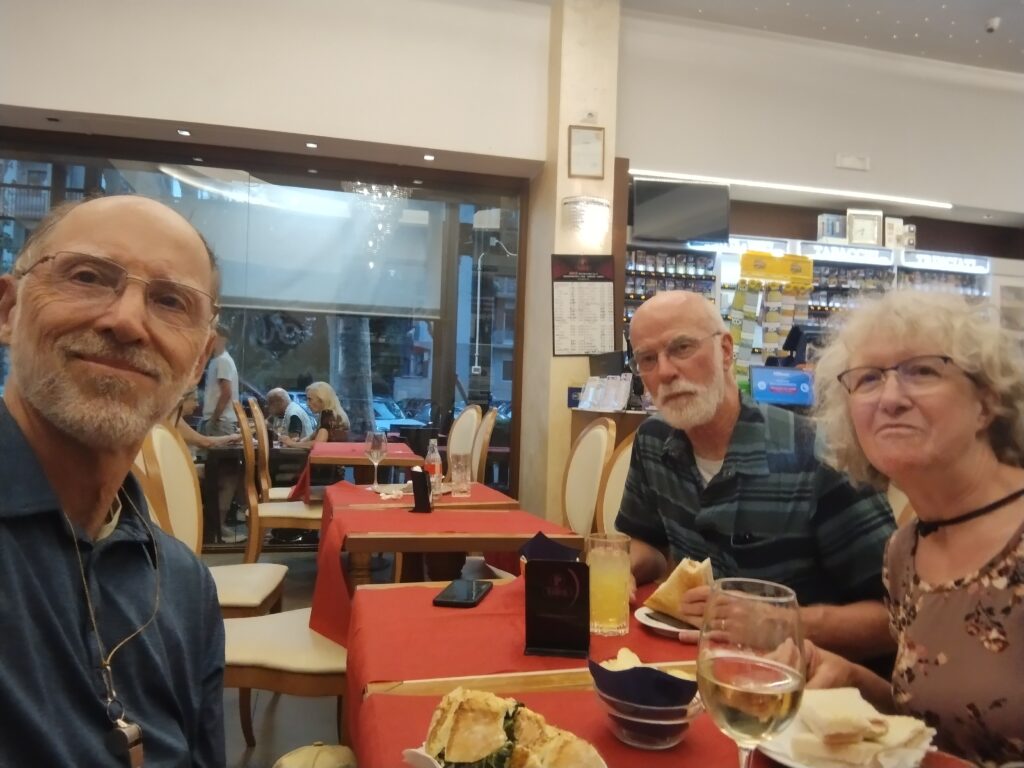Fun, Spring Cleaning, and St. Brigid’s Day
By Robert Fontana
(reprint from 1/31/2016)

Faith can be fun for kids and adults alike. In fact, if it is not fun some of the time, even for us older folks, faith will lose its power to touch our imaginations and enrich our lives. One way to keep faith fun in the home is to select a few of your favorite saints – perhaps those saints with whom your children share a name or with whom your family has a cultural connection – and plan to celebrate their feast days in your home with good food, a children’s version of the saint’s story, and some sort of prayer ritual.
We Fontanas like to observe the Feasts of St. Joseph (March 19) who is the patron saint of Italy, St. Clare (August 11) and St. Francis (Oct 5), and of course, our Irish patrons (Lori’s side of the family) saints Patrick (March 17) and Brigid (Feb 1).
St. Brigid’s feast day is Thursday, February 1, which, in Ireland, also marks the first day of Spring. So on St. Brigid’s Day we are going to gather with family for some good Irish stew and some good Irish faith-fun, including the following prayer service:
Begin with this Prayer to St. Brigid
Saint Brigid, daughter of Ireland and lover of Jesus, draw us by your prayers into the living flame of God’s love. Help us to clean our hearts and homes of all that is selfish and sinful. Pray that we will be attentive to the poor and spiritually abandoned, that we will practice the Beatitudes in good times and bad, and that the warmth of God’s love will animate all that we say and do.
Each member of the home then takes a bandanna, handkerchief, or even a cloth napkin in hand and walks through the house, dusting the furniture, TV, books, and lamps, etc. singing “Alleluia, alleluia, alleluia.”
When the house has been thoroughly dusted, all go outside and tie the cloths on the branches of a shrub or tree (or porch railing). Then together, pray this prayer:
All: St. Brigid, come this day to our home and hearts; come by the power of God and be our guest. And help us, dear Brigid, to wipe away the dust of too much “me, and my, and mine” that we might love others with a selfless heart. We pray this in the name of Jesus. Amen.
Our Father…
Return to the house for dessert (Irish mint ice cream!)

I DON’T LIKE JESUS
By Robert Fontana
Jesus lives in my neighborhood. I do not mean to shock you with this fact, but I don’t like him. When I see Neighbor Jesus coming towards me or find myself walking towards him, I want to avoid any interaction. Neighbor Jesus is nothing like the Bible Jesus I see depicted in movies, hear about in sermons and homilies, or even imagine in my own mind. Bible Jesus is awesome! He is a great storyteller, welcomes children, loves animals and nature, challenges hypocritical religious leaders, and comforts the sick and the sorrowful.
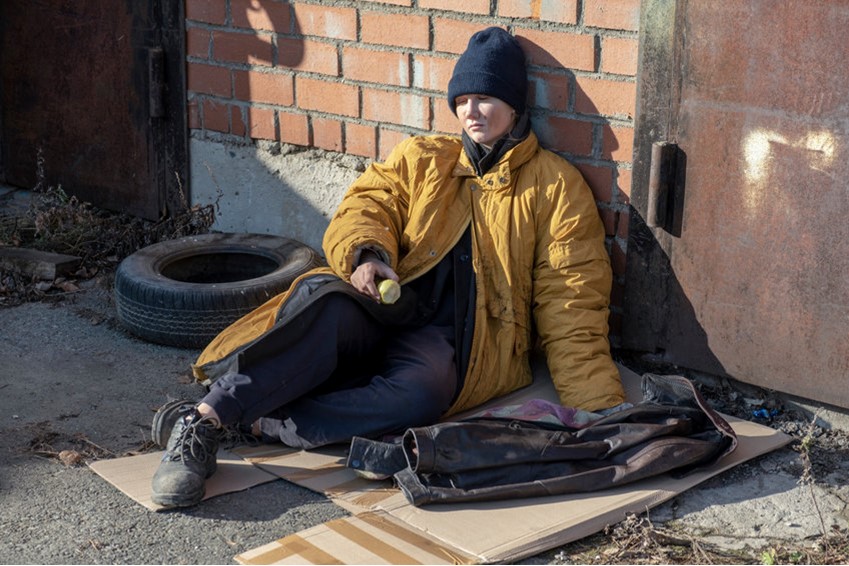
I like Bible Jesus. But Neighbor Jesus, that’s another story.
Neighbor Jesus lives in the green space near our home that is about one-half mile long and maybe 100 yards wide. The green space begins at Cowen Park which has a large open meadow and playground. The green space continues east forming a deep ravine with a flowing stream and lush trees and ferns on either side. It concludes at Ravenna Park with a ballfield and playground which give the green space its popular name, Ravenna Ravine.
At a random point anywhere between the two parks, Neighbor Jesus will find a spot to call home and settle in. Sometimes this means he brings in a tent along with a collection of items I assume are stolen from people’s yards and nearby stores. These items get strewn around his tent along with milk cartons, food wrappings, plastic bags, and other garbage. And, yes, when Neighbor Jesus leaves one spot to move to another, he leaves his former spot a mess for someone else to clean up.

Neighbor Jesus is nice enough, though I have heard some angry outbursts from him on occasion. We do exchange pleasantries when we cross paths. Lori and I have “friendship bags” prepared for people whom we encounter who do not have homes. These bags contain soft food items, socks, sweet treats, and a handout with information about how to access nearby shelters. We’ve given Neighbor Jesus a number of these, plus I often bring him coffee and occasionally an egg sandwich. He is grateful for these kindnesses.
I confess I don’t like continuing to give him these friendship bags because I do not want him to stay in the area. I certainly do not want him to know where I live and have him come knock on my door asking for help. And I don’t want to be picking up all the “trash” from the Friendship Bag that I gave him only a few days ago.
I walk through the Ravenna Ravine 3-4 times a week for my prayer time. I walk through the beautiful and diverse trees to spend time with Bible Jesus whom I like…and I do not want to encounter Neighbor Jesus. I do not like finding him sprawled out under a tree or hanging out on a bench asking me for a “cuppa coffee.” He ruins my time with Bible Jesus! He’s such an inconvenience!
Just today we had such an encounter. I was polite enough as I spoke to Neighbor Jesus who was just waking up, huddled beneath a tarp, obviously freezing cold in the 19-degree weather overnight. Yes, he asked me for coffee, and I said, “No, sorry, I don’t have any.” Which was true; I wasn’t carrying any coffee with me. But what I was really saying was, “Don’t interrupt my time with Bible Jesus! I only have so much time, and I don’t want to use it up on you, Neighbor Jesus.”
Predictably, as I walked away and turned my attention to Bible Jesus, I felt uncomfortable. I could hear Bible Jesus reminding me of a key passage from Scripture, “When I was hungry…sick… imprisoned…naked…you comforted me.” And then I heard a voice in my head/heart say, “There is little difference between Bible Jesus and Neighbor Jesus. Neighbor Jesus is what Bible Jesus looks like crucified, crucified by who knows what. Childhood trauma? Severe addiction? Terrible decisions? All of the above? Perhaps he has a criminal record? Perhaps he has burned all his family relationships? What is yours to do now?”
I walked back to Neighbor Jesus whose birth name is Jay and asked if he still wanted that coffee. “Yeah,” he replied, sitting up. “And you got one of them bags with stuff for me?”

“Wait here,” I said. And I walked back home to get hot coffee, an egg sandwich, and yet another Friendship Bag for my Neighbor Jesus.
NEW YEAR’S RESOLUTIONS THAT WILL CHANGE THE WORLD…ONE PERSON AT A TIME
By Robert Fontana

Every human being is a child of God, endowed with gifts to enable him or her to be a power for good in the world. At this time in history of great polarization, tribalism, and war, it is essential that we resolve to be the change in the world that will truly contribute to the common good. Here are a few suggestions:
1. Pray to the Holy Spirit every day for the grace to be alert to how you can be a power for good within the relationships, commitments ,and circumstances of your life, especially in the home and at work.
2. Cultivate silence in your day, 10-20 minutes of silence, to slowly learn to grow in self-awareness and to learn to listen with the ears of the heart.
3. Pray with and befriend a faith community different from your own. If you are an active Christian, consider meeting with a local Muslim, Hindu, or Jewish community. Be curious about what they believe and how this impacts how they live. As appropriate, share your own story of faith, and look for what you hold in common.

4. Make a commitment to be in nature 2-3 times (at least!) a month. Psychotherapists are increasingly urging clients to spend time in nature as a method for calming one’s anxieties and as an anecdote to depression. Nature has an enormous healing capacity for those open to it. This means time in nature (it could be your garden) to listen, feel the breezes and wind, and simply gaze at its beauty, rather than always doing the more active pursuits of hiking, skiing, and biking. Most people are “nature starved.” For Catholics, nature is a sacrament capable of revealing the hidden presence of God.
5. Strengthen the bonds with the primary people in your life. If you are married, work on your marriage. If you have children, have family meals throughout the week, and family time without electronics. Single or married, be intentional in spending time with those people who help you be your best self.

6. Lastly, during this election year, commit yourself to protecting democracy at home and abroad. This is not a partisan resolution. Whatever your politics, protecting democracy is essential for protecting religious freedom, freedom of the press, freedom to gather, and other freedoms outlined in the U. S. Constitution. To quote Winston Churchill: ‘Many forms of Government have been tried, and will be tried in this world of sin and woe. No one pretends that democracy is perfect or all-wise. Indeed it has been said that democracy is the worst form of Government except for all those other forms that have been tried from time to time.…’
The birth of Jesus for troubled times
By Kathleen Kichline
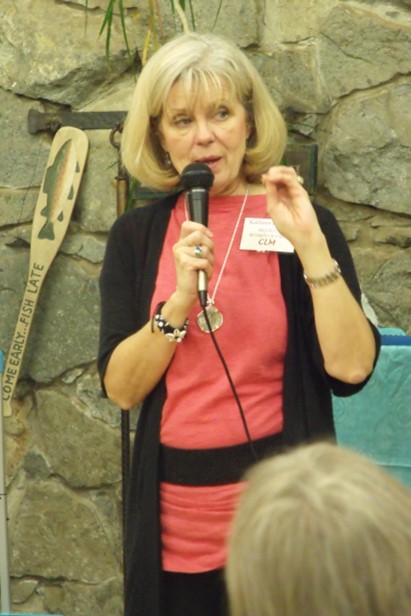
There are times in our lives and times in our world when Matthew’s telling is a more accurate rendering, when the circumstances Matthew describes resonate with our own experience. Matthew speaks of troubling dreams, Herod killing the children of Nazareth, and a family fleeing under the cover of darkness to seek refuge in a foreign land. This, too, is Christmas. It is “Christmas, The Rest of the Story.”
If we only focus on the familiar, beloved Lukan version, we can limit the manger to a gathering place for the wide-eyed child, for those singing “Joy to the World,” and for families reunited for the holidays. But Christmas is also for the one who just buried a loved one, for the parent who cannot afford food for their child—let alone a gift—for the sick, the confused, the addicted, and for those with nowhere to sleep that night. These may not recognize themselves in the perfection of the Lukan story, one we have painted over in the warm glow of Norman Rockwell scenes. The stark simplicity of the original telling has been spiced with gingerbread and peppermint, transferred to a snowy clime, plumped with festivities and food, and turned into a scene that resembles a Hallmark greeting card, a scene that painfully excludes those whose lives look nothing like that, whose lives are less than perfect, those, in fact, who are most in need.
What if the story were told instead of a father awakened by a nightmare to sit bolt upright in bed, cold with fear. Only it was no nightmare; it was warning, and it was real. He knew because the angel had warned him before and could be trusted. Evil, dangerous men were coming in search of his wife and his child, intent on murdering them in their beds. He only had time to awaken them, gather a few things, and flee into the night.
Guided by stars and perhaps more dreams, he leaned into the desert winds, looking over his shoulder, and shielding his family. They left all that they knew, uncertain of when or if they would return, and they descended into the foreign land of an ancient enemy, there to seek refuge and hide among those they did not know. And amid all that chaos, the story reaches its climax…that in the middle of all the chaos, God was with them.

Maybe if you have had cold sweats, have feared for your life or your child’s, have owned nothing more than what you could pack on your back, maybe if you have heard your neighbors’ screams in the night, have left behind family and friends, are alone, hungry and tired and aching, maybe you would hear this story and think, “Yes, that man is me. That story is like mine.” And when you heard the punchline, “God was with them,” you would be startled and look around to see if God could also be with you.
That might become your Christmas story, at least for this year. Once upon a time, you would say, when my life was in peril and at its worst, God was with me. That is what Emmanuel means, God-with-us. And that Christmas story would become your own.
_________________________________________________________________________________________
This article comes from Kathleen’s book, WHY THESE WOMEN? TAMAR, RAHAB, RUTH, AND BATHSHEBA (pp. 139-140); used with her permission. You can buy it on Amazon at https://www.amazon.com/Why-These-Women-Stories-Before/dp/B09R2WRK8W. Better yet, go to your local book store and ask them to order it for you!

Countdown to Epiphany, this prayer can help

Many Catholics and other Christians do not celebrate the great feast of Epiphany which commemorates when the “Magi from the East” visited Bethlehem and the Christ child. They follow the secular trend of ending the Christmas celebration on Christmas Day or shortly thereafter. They might sing the popular Christmas carol, The Twelve Days of Christmas, but they do not understand its meaning. The title of the song refers to the 12 days between Christmas and Epiphany. Here’s what Wikipedia writes about this time period:
In many Western ecclesiastical traditions, Christmas Day is considered the “First Day of Christmas” and the Twelve Days are 25 December – 5 January, inclusive, making Twelfth Night on 5 January, which is Epiphany Eve. In some customs, the Twelve Days of Christmas are counted from sundown on the evening of 25 December until the morning of 6 January, meaning that the Twelfth Night falls on the evening 5 January and the Twelfth Day falls on 6 January.
We have a special family gathering on the Feast of Epiphany. It’s when we exchange gifts with one another, have a great meal together, make crowns of the Three Kings for all to wear, play games and sing carols. And to help us countdown from Christmas to Epiphany we have this prayer ritual at dinner for the Twelve Days of Christmas:
- Light three candles representing the gifts of gold, frankincense, and myrrh. Pray the following prayer together:
- To Bethlehem we travel with the Magi from the East, across the days of Christmas to the Epiphany Feast. Give us the courage of the Magi as we begin our search for you. Give us the eyes of the Magi that we might see the star that leads us too. And when we get to Bethlehem on that Holy Epiphany Day, give us the heart of the Magi that humbles us to pray.
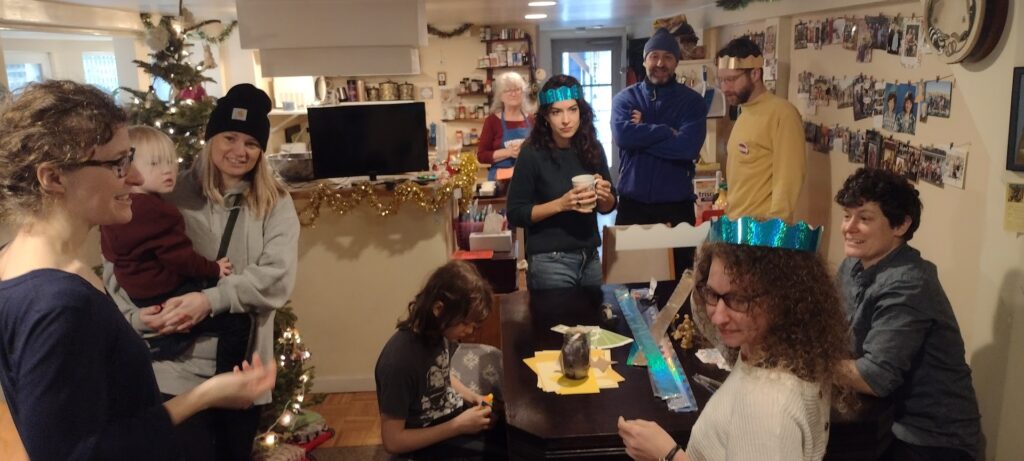
Plan a fun gathering for your family and friends for Epiphany on January 6, 2024. Happy Christmas – Epiphany season!
A love note to a Christmas tree
By Robert Fontana

I love you, O beautiful tree of Christmas. You enrich my life and the lives of all who gaze upon you in wonder and delight.
Your coming was awaited with childlike anticipation. And when you arrived, the busyness of the house stopped so all could welcome you. Treats were shared and wine was poured as you took your place in the corner of the family room, an honored guest.
You are lovely in your simplicity. Still, we dressed you with a string of lights that glow like fireflies in the night. Then your magic began, for it seems you are some sort of mystical portal to the past. I can see my father toasting his sons with a glass of Mogan and David and my mother, cigarette dangling from her mouth, laying tinsel strand by strand on the Christmas tree of my childhood.
Other memories emerge as we grace your branches with ornaments, some homemade, some gifted, some in honor of the holy event we commemorate, and some as playful as a toy plane, a doll, or an elf from Santa’s workshop. With each adornment, stories are shared. With each sharing, new images from the past flow around us: cousin Wade running in from the outside delirious with joy; my brothers in their red Boys Choir blazers preparing for midnight Mass; and friends gathered around the piano to sing “Sister Mary Had a-But One Child” to Mom’s accompaniment.
O Christmas Tree, I see in you all the Christmas trees of my past, from the great pine my brother John and I cut down and dragged into the family living room, to the silver one that shone brightly at Grandma’s house, to the very first tree of our marriage, a “tree” that Lori and I created from cast-off boughs collected at the Christmas tree lot because we could not afford even the $10 for the smallest tree.
We have gathered our children around you, and now our grandchildren, all in memory of the God of love who sent us Jesus to teach us how to love. You, O Christmas Tree, have been a sacrament of this season, a source of beauty and unity of past and present. And like the Christ-child who will give his life for all of creation, you give your life so that we may celebrate these days in the grace of your presence.
I do love you, O Christmas Tree, and I thank you!

I NEED CHRISTMAS (AND SO DO YOU!)
By Robert Fontana
I shared a bedroom with two brothers, Francis (older) and John (younger). On Christmas Eve, we three Santa Claus believers were on high alert listening for any signs of St. Nicholas. I clearly remember one night when we almost jumped out of our pajamas believing we had heard the jingle of bells outside, signaling the arrival of Santa and his sleigh. We rushed to the window and scanned the sky for signs of Santa. (Can you guess which one I am in the photo below?)
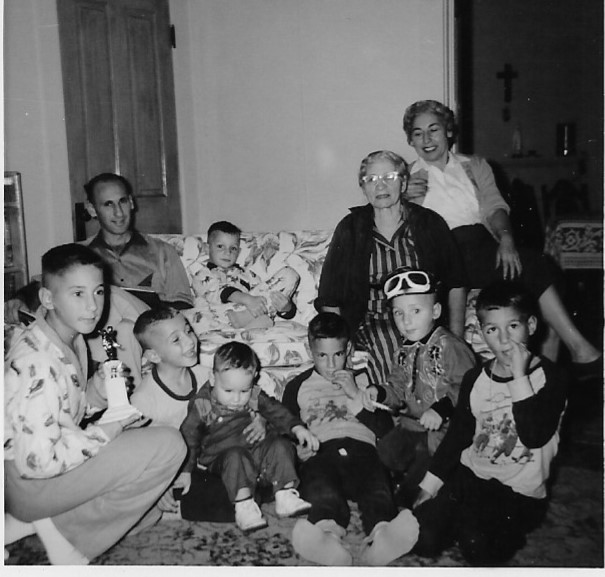
I’m not sure when we learned that Santa was just a fun story and the gifts that showed up after Midnight Mass came from Mom and Dad. But in that transition, I learned that the real reason for the “Christ – Mass” at midnight was the birth of God’s beloved Son, Jesus. That story carried me for a while with a child’s faith. I said my prayers at night – Our Father, Hail Mary and Glory Be – and during every football game my brothers played in.
My child’s faith, which was basically the faith of my parents, was transformed into my own personal faith when I was in 8th grade. Mom and Dad had been having marriage trouble. Rather than going to divorce court, they went to a prayer meeting; and each had a personal experience of Jesus that changed their lives. Their transformation transformed me. Dad shared his faith with me, and I had a burning in my heart to know God’s love and friendship as he did.
That made all the difference in my high school years. I struggled with all the same adolescent issues that others did, e.g. self-esteem, friendships, siblings, parental approval, sexual discipline, girls, college, academic challenges, athletic challenges, and developing the coping skills to handle all the emotional issues that come with teen life. Faith in Jesus offered me a healthy way to manage these difficult emotions and saved me from “going off the deep end.”
Not so for some of my friends who did not have the experience of faith that I had and coped with teenage life by dabbling in drugs, drinking, and sex. By the time college came around, these ways of coping were ingrained habits that nearly killed them. Thankfully, some found a path towards sobriety and loving relationships later in life. I believe I was protected from a similar path by God’s grace, and the Catholic Christian friends that I was meeting through the high school retreat program called Search.

I learned early on that “I wasn’t good because I loved God,” to quote Fr. Richard Rohr, “I was good because God loved me.” And I needed God’s love and the love of friends to continue working at being good and doing good. That was true in my youth, and it is true today. Pastor Rick Warren, the founder of Saddleback Church, once said, “Under the right circumstance I’m capable of any sin and, so are you.” When I heard that, I said to myself, “and so am I.”
I need Jesus and a community of faith in my life to help me live a healthy, holy, humane life this side of heaven. In fact, this is one of the reasons for Christmas. Jesus, God’s beloved Son, born of Mary, came to give men and women a better way to live, as summarized in the Great Commandment: love of God and love of neighbor. In following the Jesus way of living, we get a taste of heaven before heaven. Not perfectly, not without pain and suffering. Yet, the path of faith, hope, and love, embraced as a way of life, does yield the fruits of the Spirit described by Paul in Galatians, “love, joy, peace, patience, kindness, generosity, faithfulness, gentleness, and self-control.” Wouldn’t that be a taste of heaven if we had these qualities as a pattern for our lives?
That brings me to Christmas. Jesus is the reason for Christmas, and his legacy of unselfish love of neighbor animates this time of the year even in its secular form. We see the evidence beyond the lights and glitter of commercial Christmas: family and friends laying aside hurts and grudges and gathering in homes for song and merriment; Salvation Army and St. Vincent de Paul volunteers collecting money, toys, and clothing for those in need; neighbors reaching out to each other with a plate of cookies or gingerbread; and strangers offering one another a cheery “Merry Christmas” or “Happy Holidays.”
The power of Christmas to animate the culture was most eloquently expressed in Charles Dicken’s story A Christmas Carol.

Scrooge, arguing with his nephew Fred about Christmas, is emphatic that Christmas, because it has not made Fred a richer man, has done him no good. Here is Fred’s response:
“There are many things from which I might have derived good, by which I have not profited, I dare say, Christmas among the rest. But I am sure I have always thought of Christmas time, when it has come round, — apart from the veneration due to its sacred origin, if anything belonging to it can be apart from that, — as a good time; a kind, forgiving, charitable, pleasant time; the only time I know of, in the long calendar of the year, when men and women seem by one consent to open their shut-up hearts freely, and to think of people below them as if they really were fellow travelers to the grave, and not another race of creatures bound on other journeys. And therefore, Uncle, though it has never put a scrap of gold or silver in my pocket, I believe that it has done me good, and will do me good; and I say, God bless it!”
I need Christmas, and so do you. “God bless it!”
PS: I’m the one wearing the goggles. Francis is sitting next to my dad. John is the little guy with the white shoes.
Homespun Homily by Lori: The Chaplet of Divine Friendship
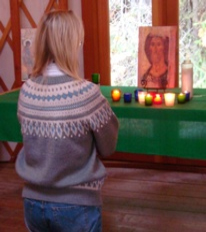
During the months of lockdown in the pandemic, one benefit we enjoyed was that Robert and I grew in our appreciation of the Chaplet form of prayer. We prayed the Divine Mercy Chaplet with family members and friends over Zoom. Soon we discovered the sung version of this chaplet, which I especially enjoy praying and singing through.
Eventually, Robert developed our own simpler form of the chaplet type of prayer, calling it the Chaplet of Divine Friendship. The format is very similar to other chaplets, with an introductory prayer, the antiphon chanted before each of the five “decades,” and the ten repetitive short prayers, prayed in the call and response pattern.
The chaplet prayer has much in common with the rosary. Its repetition allows for calm reflection. It doesn’t require a lot of thinking but rather touches the heart and the spirit. This is one reason why I appreciate this form of prayer so much – when I pray / sing the chaplet, my worries are pushed to the side. My anxious thoughts are drowned out by the simple declarations of faith in the chaplet’s prayers. Praying the chaplet helps me in my everyday life. It is a form of contemplative prayer.

I pray it when I’m driving – I can hum the prayer and still pay close attention to the crazy Seattle traffic. I pray it when I’m waiting – in grocery check-out lines or at a grandchild’s soccer practice. I pray it when I’m walking to the post office or library, when I’m worrying about a problem as I wash the dishes or clean the bathroom, when I awake in the night and can’t sleep. Increasingly, I’ve been intentional about turning to this simple prayer because I KNOW it’s so much better, so much more productive than complaining or ruminating or drowning in “what if’s.”
We hope that you will take a look at the Chaplet of Divine Friendship which we’ve recorded at this YouTube link: https://youtu.be/xX_idGXc-20
Try it for Advent. Use your rosary to help you keep count of the chaplet decades. May it be a help to you, a calming, encouraging reminder of the great love of Jesus for YOU.
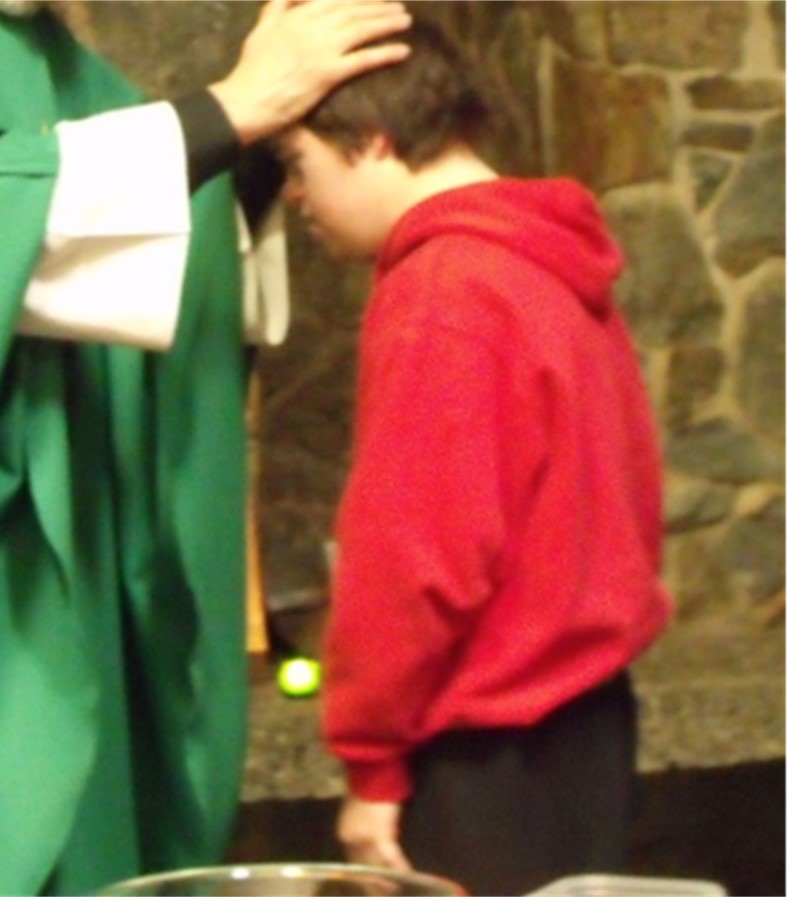
An Advent Spiritual Practice: The Chaplet of Divine Friendship_________________________________________
Opening Prayer – In the name of the Father…Abba Father, Lord of heaven and earth, you created woman and man in your image and likeness and planted them in the garden of earth to love one another and to care for the flora and fauna of the earth. You did not leave them alone but walked alongside them as you walked alongside our biblical ancestors Abraham and Sarah, Isaac and Rebekah, and Jacob and Rachel. And in the fullness of time, you sent your beloved Son Jesus, to be not merely our Lord and Savior, but our friend. Jesus said, “I have called you friends, for everything that I learned from my Father I have made known to you.” (John 15:15) (5 decades)
All– Abba Father, so loved the world, he gave His only Son, not to condemn the world but to save everyone, to save everyone.
Leader – Jesus our brother, kind and good (10 x’s)
All – I trust in you, I trust in you.
After the 5th decade:
Closing Prayer: Abba Father, Lord of heaven and earth, thank you for giving us Jesus as our friend and brother. Help us to return His friendship by being attentive to the Holy Spirit’s working in our lives and in the world and having the courage to follow the Spirit’s prompting always. In the name of the Father…
A Reflection on Women in the Church (guest writer)
Lorene Davidson was asked by our pastor to give a reflection on Women in the Church in place of his homily on the Feast Day of ST. Phoebe, deaconess and companion of St. Paul (Romans 16:1). She has given us permission to reprint it here.

When Fr. Oliver asked me to offer this reflection, I had just heard Maria Laughlin from St. James Cathedral share her experience of the synod gatherings in our archdiocese. It filled me with hope for the future of our church. People of all ages and backgrounds came together to listen to each other intentionally and share from their hearts what they envision for the future of our church. She said that the Holy Spirit’s presence was evident.
When the results of the first phase of the global synod were published, I felt uplifted and energized. People from all around the world believe that there is an urgent and critical need to rethink women’s participation in the church. The number of priests is dwindling. We need more vocations to the priesthood, but we also need laypeople to step forward to help – both laywomen and laymen. Religious women and men are also a great resource.
There are nuns all over the world carrying out leadership roles, but they often lack official recognition or support. There are women in the Amazon acting as deacons with the blessings of their bishops. Because there are so few priests, some remote communities do not see a priest for six months to a year. These women are baptizing, officiating at marriages, and ministering to the spiritual and physical needs of the communities. And yet, these women cannot be ordained as deacons.
Where is St. Phoebe in all this? St. Phoebe was a deacon and benefactor of the church in Greece. She, along with other women and men, spread the gospel across Asian Minor and east to the Roman Empire. St. Paul himself commended her to the Christian community in Rome, asking them to receive her in the Lord and treat her in the manner of the holy ones. Paul said that she was a benefactor to many including himself. (Romans 16:1-2). Think of the courage it took for a woman to travel 700 miles to a country and community she did not know. Imagine that strength of her faith. She is a reminder that there is historical precedent for women deacons in the Catholic Church.
I have seen so many changes in our church during my lifetime. When I was a child, we did not have “Altar Servers,” we had “Altar Boys.” There were no lectors or Eucharistic ministers. The priest did it all. Of course, most parishes had two, three or more priests to divide the labor. Our priests need our support. And many of them would welcome it.
My mother is often on my mind when I am a server, lector, or Eucharistic minister. She and many of the women in her generation would have welcomed the opportunity to serve in the way women can now serve. I am so thankful that I can participate more fully in the life of our church. The last few years I have been serving at daily Mass with a team of eight other women and men. As a server I feel even more connected to the liturgy and the Eucharist. As a Eucharistic minister I feel a special bond to each communicant. I am in awe of offering them the body of Christ. As a lector, the connection to the word of God, studying it, reflecting on it offers new insights into God’s message.
And His message can change in different circumstances. For example, Mark 16:18 says, “they will pick up snakes with their hands, and if they drink poison, it will not harm them.” I could not relate to this until I went to healing ministry with two women from our parish. They gave me several Bible verses to meditate on while I was in treatment for cancer. It was like the Holy Spirit turned a light on in my head. These words were spoken 2000 years ago, before there was chemotherapy, and yet they are a perfect description. It brought me peace and calm. It gave me hope.
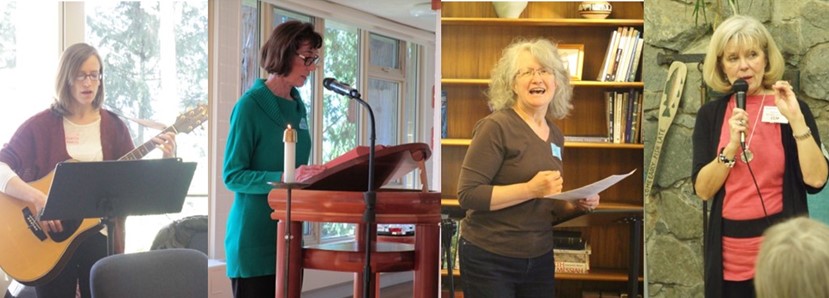
This healing ministry is just one example of the important work women in our church are doing. Look around you in our parish – at Mass and in the wider community, women are serving the needs of others. They are Eucharistic ministers, ushers, lectors, members of the RCIA team, teachers in religious education, members of St. Vincent de Paul, members of the parish council and countless other ministries. There is a saying, “Women hold up half the sky.” Women and men need to serve together, but as equals.
We all become disciples at our baptism. We all have different gifts, through God’s grace. God wants each of us to use our gifts to support each other and our community. As I look around our parish, I am amazed at all the time, treasure and talent that is given. This is exactly what is needed to strengthen our faith and our church. As we approach the start of the synodal assembly [in October], I am optimistic. The members of the synodal assembly will gather in Rome to discern what steps the Holy Spirit invites us, the Universal Church.
To grow as a synodal church, the pope has appointed 450 participants, including dozens of religious women and men and lay people from around the world, to attend the general assembly of the synod of bishops. The voting members number the pope plus 363 cardinals, bishops, priests, religious, and lay women and men. Out of the 364 members who can vote, 54 are women…either lay or religious. This seems very positive to me. Let us pray for the members’ thoughtful discernment and blessings on church renewal.
The Long Road to Rome
By Robert Fontana
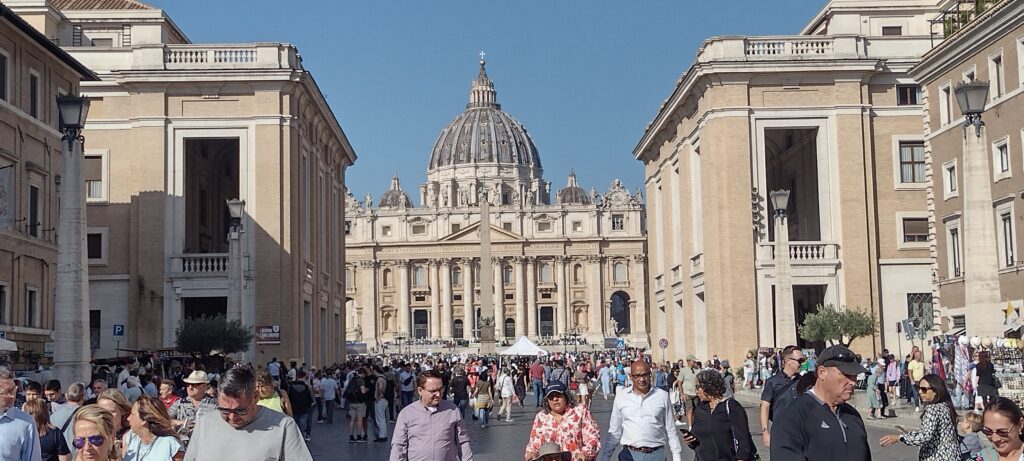
When Lori and I first confronted the issue of cover-up of clergy sex abuse by our then bishop and friend Carlos Sevilla, our first instinct was that I should resign from my position as Director of Evangelization and Deacon Formation for the Diocese of Yakima. We wrote about our decision to our family in Louisiana. My sister-in-law, Lise, whose husband, my brother, has represented hundreds of victims of clergy sex abuse as their attorney, wrote back with, “Don’t do it. That’s exactly what they want! They want you out of their way.”
We took her words to heart, prayed, and heard Jesus say to us, “Do you love the Church enough to stay in and work for change? You don’t have to do this. But somebody needs to bear the cross that working for change entails.”
It was clear to us that if we do not work for change then we must not only quit ministry but quit being Catholic. Otherwise, knowing what we know and not speaking up would make us complicit. That was true then, and it is true today. Over the past 21 years we have organized listening sessions to have survivors of sex abuse tell their stories; written the Pope’s ambassador to the US twice (never heard back from him); met with the Cardinal of Chicago, Francis George; organized days of prayer and fasting; and led workshops to inform people about the sex abuse crisis. I even wrote my doctoral thesis on training lay review boards to function as watchdogs over sex abuse cases and not just function as advisory boards.
During this time, I was banned from working at any Catholic church or institution in central and western Washington. I did CLM ministry in the homes of friends, gave retreats at other Christian churches, and traveled to other states where clergy friends and CLM sponsors would have me speak. Finally, in the summer of 2019, after Pope Francis published new rules stating that whistle-blowers ought to be protected in the Church, I filed a whistleblower complaint against the former bishop of Yakima, Carlos Sevilla, for his retaliation against me. The complaint was received, and the former bishop of Yakima was reprimanded for causing “harm and scandal” to the Church.
When, in late July, Tim Law, a friend and the founder of End Clergy Abuse (ECA), told us that he and survivors from around the world were going to Rome ahead of the Synod to walk a pilgrimage route, carrying a cross, to lobby the Vatican for stronger protocols to protect children and whistleblowers, we jumped at the chance to go. Tim, who is not a survivor of sex abuse but is a vigorous advocate for survivors, and eight others who are survivors began their walk on Sept 21. We joined them on Sept 23, three days into their trip. We walked with them, taking our turn carrying the cross for the final pilgrimage days, covering about 66 miles. OUCH! It was long, hard walking but beautiful sharing when we could keep up with the group’s pace.
We met several Italian “angels” who directed us along the right path. On our first day of walking we came to an area with a dozen downed trees blocking the path. An Italian “angel” appeared walking from the other direction and lifted the tree trunk just enough for several of us walkers to slip underneath.
On our second evening of walking, we came to the town where the main group was staying. Our accommodation was still another 45-minute walk to the outskirts of the town. As darkness fell, the hostess came riding her bicycle up the hill to meet us. She took our packs on her bike and assured us that we were almost there. On our third evening, we were searching in vain for our bed and breakfast. Stopping at a busy pizzeria to ask directions, we met a family, Luca, Sylvia, and their son Andreas. The parents spoke some English and listened to our plight. After a rapid family discussion in Italian, Sylvia said, “My husband knows this street where you are going. He is an electrician working at a home on this very street. He will drive you there after we eat our supper.” And he did! The providence of God!
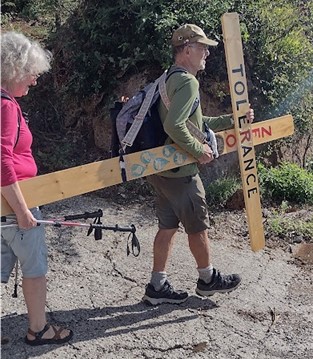
Our small group met a larger group of survivor lobbyists, folks from Jamaica, Canada, Peru, Mexico, Slovenia, Italy, Germany, Philippines, Costa Rica, Serbian, New Zealand, India, Congo, and Uganda. What courageous men and women, coming to Rome at their expense, demanding that Pope Francis do more to change Church law and practice to better protect minors and vulnerable adults from sexual exploitation.
There were press conferences (I was interviewed by Associated Press and Reuters, and Lori, though trying to stay in the background, got her picture in the Reuters newsfeed); protest rallies outside St. Peter’s; organizational meetings; letters presented to the papal commission on sex abuse; and planning for the next leg of the journey – taking this issue to the United Nations in Geneva. This part of the journey was for a select few.
As others went on to Geneva or returned to their homes, Lori and I stayed in Rome to participate in an ecumenical prayer service led by the Taize community for the upcoming Synod. Pope Francis participated in it as well as representatives from the major Christian denominations and Churches. In fact, a female Lutheran bishop who was on the podium with Pope Francis stayed at the convent where we also stayed. We had breakfast with her the morning following the service. The prayer service was attended by several thousand people including many, many young people from across Europe. It concluded with the veneration of the cross of San Damiano, a replica of the one from which Francis of Assisi heard the words, “Francis, go and rebuild my church for you see it is in ruins.”
Lori and I with Tim Law of Seattle and the End Clergy Abuse delegation are doing our part to continue the call given to St. Francis to “rebuild the church” that is in ruins due to the crimes and sins of clergy sex abuse and cover-up. We think we have had an impact. While we were in Rome, we read that the papal commission on sex abuse sent a statement to the delegates at the upcoming Synod insisting that the issues of sex abuse of minors and vulnerable adults be at the center of their deliberations. We are grateful to Tim Law for including us to be a part of this effort. Please keep Tim and the good work of ECA (End Clergy Abuse) in your prayers.
